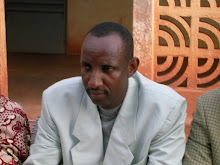With regard to the present debate about the new code of the family in
The laique state of the second millennium neither needs, nor has a vocation for coming into conflict with religion: a recognition and a mutual respect are sufficient. For some observers, analyzing this new document, sometimes, it emerges the existence of a denial of some religious obligations hanging over Moslems, where a right of choice had to be given in order to let everybody recognize him/herself in the code. For others, this code is a progress made by the Malian democratic State. After 50 years of independence, the country is endowed with a document which takes into account people’s various aspirations.
The 1143 articles-document has the quality of projecting the Malian society in modernity without losing sight of our true values of culture and civilization.
In this respect, the new code is a compromise work. It’s the same case in all its provisions managing marriage, successions and kinship through which the citizen profits from the liberty of choice. It’s possible for him/her to make up his/her mind according to the principles of his/her culture, convictions and religion in the respect of law.
The document offers a new legislation as regards succession and donations. But this new legislation will not apply to those who, during their lifetime, will have to order, through a testament, or any other written paper or before some witnesses, that the succession be devolving according to religious or customary rules.
Since the local and national consultations, we must notice that it emerged basic differences as far as the interpretation of the document is concerned. These concerns of the religious community of Mali were essentially based on four (4) points, i.e., the withdrawal of the sanction of the religious chief for the religious celebration of marriage before that marriage before the Mayor/register, the title of heir for natural children and the establishment of his/her filiations, the question of filiations - adoption and the must for the woman to contribute in the household expenses in case she practices an activity. These concerns of the Muslim community and other strata of the Malian society have largely been taken into account in the new code.
With the adoption of this Person’s and Family code, the Muslim community in
It’s in this context of tensions that the Chief of the State spoke to the nation on August 26th,
It’s noticeable that the repeated failures as far as the re-reading of the Code is concerned, show that the changes of the society are not decreed, because they are delicate and difficult. These changes are often accompanied by disinformation, a deficit of communication, but also by objective remarks to be necessarily taken into account. The recent events in
The President of the Republic has pointed out in his speech to the Nation : “We must keep in mind that this Person’s and Family Code is particular because it manages three (3) key domains : faith, tradition, and intimate life. And we must also remember that any regulation related to these domains, directly deals with the very start of the family and society. It’s particularly delicate since it wants to be in keeping with the double objective to favor reinforcement of modernization all by preserving the starts of our society. This is the reason why since 1986, our different successive governments have difficulty finding a solution reached by consensus, in which all Malians, men and women, will recognize themselves.”
In fact, it’s clear that the State must assume the responsibility of voting this code by the whole structures of the society. It’s the State and the social fabric that are responsible in this affair which has degenerated into movements of popular dissent.

No comments:
Post a Comment